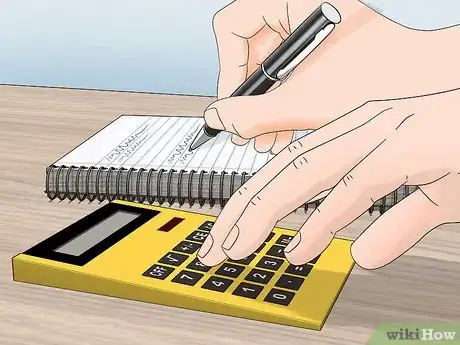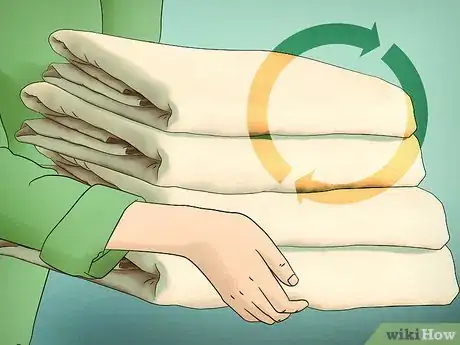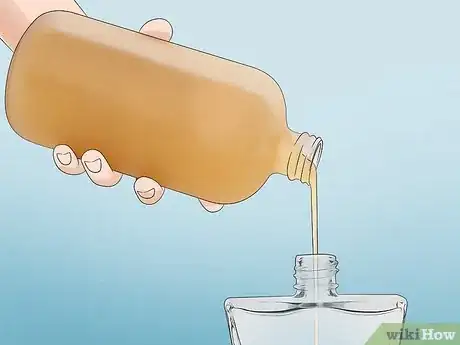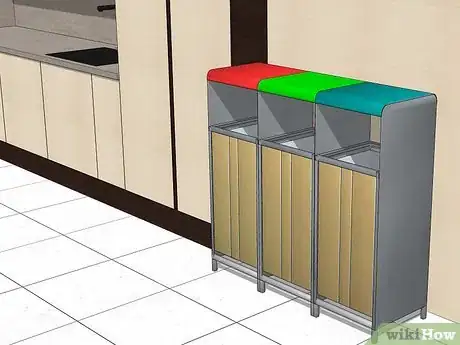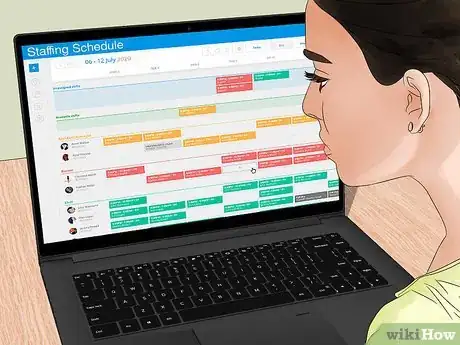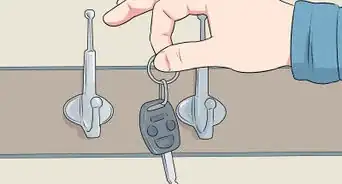This article was co-authored by Bridgett Price. Bridgett Price is a Cleaning Guru and Co-Owner of Maideasy, a maid service company that services the Phoenix, Arizona metropolitan area. She holds a Master of Management from the University of Phoenix, specializing in digital and traditional marketing.
This article has been viewed 17,783 times.
Maybe you are a hotel owner looking for ways to reduce the costs of running a business, including ways to keep your housekeeping expenses down. Or perhaps you are a homeowner wondering how you can reduce the costs of keeping your home clean and organized. To save money on housekeeping costs as a hotel owner, you should consider making adjustments to your staffing practices. As a homeowner, you should look at how you can keep supply costs down and how you can be more environmentally friendly, as being eco-friendly can lead to cost savings and help protect the environment.
Steps
Keeping Supply Costs Down
-
1Buy cleaning supplies in bulk. One way you can save money on cleaning supplies for your home is to buy them in bulk. Go to your local bulk store and buy items like eco-friendly cleaners, eco-friendly towels and rags, and eco-friendly washing supplies in bulk. Keep large quantities of dishwashing detergent, laundry soap, and other materials on hand as they never go bad. Use a little bit at a time so your supplies last for a long time.[1]
- Having cleaning supplies in bulk can also ensure you always have access to supplies when you need them. This can cut down the time and energy you would have to invest in going to the store and buying more supplies every time you need to clean.
-
2Make your own cleaning supplies. Another way you can save money on upkeeping your home is to make your own cleaning supplies using basic, household materials. You can make your own laundry detergent using washing soap, borax, and water so you do not have to buy detergent. You can also make your own all natural disinfectant using tea tree oil and white vinegar so you are eco-friendly and can cut down on costs.[2]
- You can also learn how to make your own all natural cleaner using household products so you do not have to spend money on cleaner on a regular basis. Make the cleaner in bulk so you have it on hand when you need it.
-
3Use coupons on cleaning supplies. You can also cut the cost of cleaning supplies by clipping coupons for cleaning items. Look through fliers and online promos at your local grocery store to find coupons for items like detergent, disinfectant, and surface cleaner.[3]
- You can download Apps on your phone that will list coupons for certain items or brands.
- Always compare the regular price cost of a generic brand to the coupon savings on a brand name product. Sometimes a generic brand is cheaper than a brand name product, even with coupon savings.
-
4Monitor your supply costs. Keep a close eye on how much you spend on cleaning supplies on a monthly basis. You may aim to spend less than $20 a month on cleaning supplies by buying in bulk and clipping coupons. Determine where you going over your budget on your cleaning supplies and see if you can find a way to reduce this cost.[4]
- For example, you may notice that you spend a lot of money on dishwashing detergent every month. You may then decide to make your own dishwashing detergent to save money on this cleaning cost.
Adopting Environmentally Friendly Practices
-
1Reuse towels. To cut costs and be environmentally friendly, you should try to reuse your towels when possible. If you are running a hotel, you may encourage guests to reuse their towels to cut back on cleaning costs and water usage. Have a small sign in the hotel room that notes you are trying to encourage guests to be eco-friendly by asking them to reuse their towels for at least two nights.[5]
- If you are a homeowner, you may try reusing your towels for a week and hanging them to dry so they are still clean enough to use throughout the week. You may then encourage others in your household to use the same towels for a week to cut down on costs and be more eco-friendly.
-
2Reuse old linens. Rather than throw away old linens, repurpose them as rags that you can use in the kitchen. Or stitch the old linens together to make kitchen aprons. You can also use old linens as scraps for a quilt or a blanket.[6]
- You can also re-dye old linens and use them in your decor at home or in your hotel.
-
3Eliminate paper waste. Make an effort to cut down on the amount of paper you throw away at home or at your hotel. Wait to fill up toilet paper or tissue boxes until they are almost done. Provide a limited amount of paper items in each guest room so guests are less likely to use them up or throw them away.
- You can also reduce the amount of newspapers you throw away by offering them at the front desk rather than in each guest’s room. You can also encourage guests to look at the news online.
- Always use reusable drinking cups that are made of glass instead of paper.
- Avoid providing items that are one use only, such as plastic shower cups or liners for an ice bucket.
-
4Use refillable containers. Get in the habit of using containers that can be reused and refilled at home or in your hotel. Stock refillable soap dispensers in the bathroom and the kitchen. Keep refillable shampoo and conditioner bottles in the bathroom. This will cut down on the amount of waste in your home or your hotel and ensure you do not need to keep buying new single use only items for guests.[7]
- You should also try to get into the habit of reusing containers once they are empty. Reuse containers by washing them out and repurpose them for something else, such as a garbage can, a recycling bin, or a container for other items.
-
5Recycle any products you can no longer use. To be more environmentally friendly and cut down on waste, recycle as much as you can. You may put recycling bins in a central area of your home and write a note about what can be recycled and what cannot be recycled. Encourage members of your household to recycle paper, plastic, and glass products.[8]
- You can also try to recycle any cardboard boxes that are no longer being used in your home as well as the packaging that items come in. Explain what can be recycled to the members of your household and make it a house rule that everyone must recycle.
- You can also encourage guests at your hotel to recycle by setting up recycling bins by the garbages in common areas of the hotel. You may also put up a sign in the rooms noting what can be recycled in the room and where the guests can put the items to be recycled.
Making Adjustments to Hotel Staffing
-
1Create a staffing schedule. One way to save money on housekeeping costs as a hotel owner is to create a schedule for your staff. Calculate the labor needed for each working day by considering how many guests are in the hotel and how much time it takes for each room to be serviced. Have a clear day by day schedule so you know how much staff you need and do not over staff when you don’t need to.
- Having a staffing schedule can also help you calculate your labor costs. You can calculate labor costs by taking the employees required to service a room and dividing the amount by the number of rooms that can be serviced at a specific time.
- You should also factor in insurance and employee benefits to determine how much you will be spending on staff. If the amount seems higher than other costs, you may consider how you can reduce your staffing costs without sacrificing the quality of the hotel.
-
2Monitor your staff’s overtime. Keep an eye on how often your staff works and if they are starting to work over their standard work hours. Notice if your staff seems to be working too many overtime hours, which then drives the cost of labor up. Look over the staffing schedule and notice if there are staff you can cut or hours you can reduce so staff does not work overtime.
- If you know you will need a lot of staff for busier times of the year, such as the holiday season, you may plan ahead so you have enough staff to cover the hours without having them work any overtime.
-
3Make sure your staff are always busy. You should also ensure there is a long list of secondary tasks that staff members can do if they are less guests in the hotel or less maintenance of the rooms that need to be done. Create a list of tasks for days that are slow so your staff are always busy and never idle. This will ensure the hotel is still maintained and you are being cost effective.
- For example, you may make a list of tasks like, “clean the common area, clean the back kitchen, organize the supply closets” so your staff always has something to do while they are working.
-
4Cross train your staff. To maximize your staff and keep them engaged in their work, you should try training them in a variety of tasks or roles. Perhaps you train maids in stocking the supply closet and in maintaining the rooms. Or maybe you have a supervisor take on the manager role when the regular manager is unavailable.
- Though it may take some effort upfront to cross train your staff, doing so will benefit everyone in the long term. Often employees are more engaged in their job if they are given the chance to learn a variety of skills and assume different responsibilities.
Expert Q&A
-
QuestionWhat cleaning product do you really need?
 Bridgett PriceBridgett Price is a Cleaning Guru and Co-Owner of Maideasy, a maid service company that services the Phoenix, Arizona metropolitan area. She holds a Master of Management from the University of Phoenix, specializing in digital and traditional marketing.
Bridgett PriceBridgett Price is a Cleaning Guru and Co-Owner of Maideasy, a maid service company that services the Phoenix, Arizona metropolitan area. She holds a Master of Management from the University of Phoenix, specializing in digital and traditional marketing.
House Cleaning Professional Dishwashing detergent! You can use soap and warm water to clean all the surfaces in your house.
Dishwashing detergent! You can use soap and warm water to clean all the surfaces in your house.
References
- ↑ http://www.thesimpledollar.com/trimming-the-average-budget-housekeeping-supplies/
- ↑ http://www.thesimpledollar.com/trimming-the-average-budget-housekeeping-supplies/
- ↑ http://www.thesimpledollar.com/trimming-the-average-budget-housekeeping-supplies/
- ↑ http://infohouse.p2ric.org/ref/01/00356.pdf
- ↑ http://www.montana.edu/pollution-prevention/hospfcthousekeeping.html
- ↑ http://www.montana.edu/pollution-prevention/hospfcthousekeeping.html
- ↑ http://www.montana.edu/pollution-prevention/hospfcthousekeeping.html
- ↑ http://www.montana.edu/pollution-prevention/hospfcthousekeeping.html



